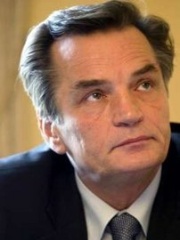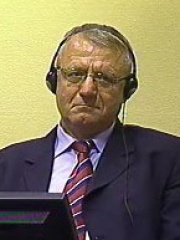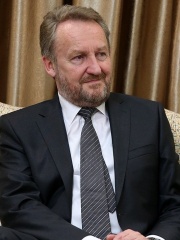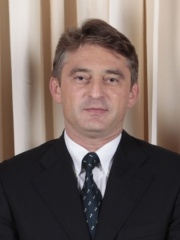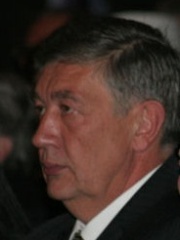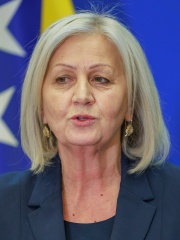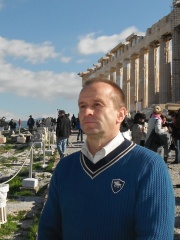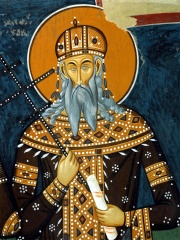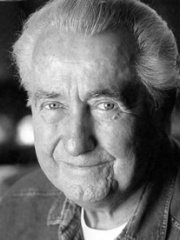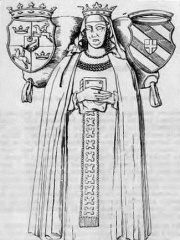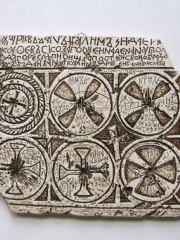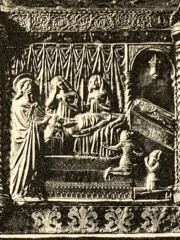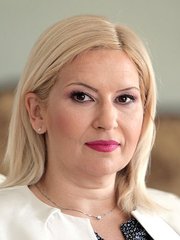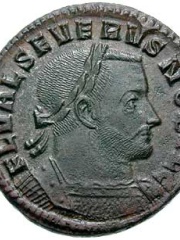
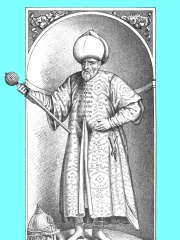
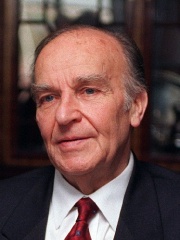
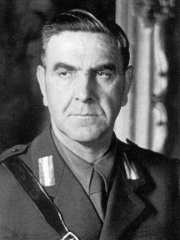
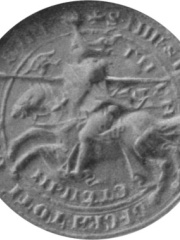
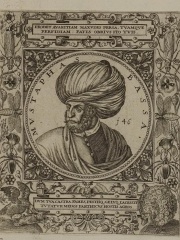


The Most Famous
POLITICIANS from Bosnia and Herzegovina
This page contains a list of the greatest Bosnian, Herzegovinian Politicians. The pantheon dataset contains 19,576 Politicians, 68 of which were born in Bosnia and Herzegovina. This makes Bosnia and Herzegovina the birth place of the 50th most number of Politicians behind Saudi Arabia, and Vietnam.
Top 10
The following people are considered by Pantheon to be the top 10 most legendary Bosnian, Herzegovinian Politicians of all time. This list of famous Bosnian, Herzegovinian Politicians is sorted by HPI (Historical Popularity Index), a metric that aggregates information on a biography's online popularity. Visit the rankings page to view the entire list of Bosnian, Herzegovinian Politicians.

1. Valerius Severus (300 - 307)
With an HPI of 77.80, Valerius Severus is the most famous Bosnian, Herzegovinian Politician. His biography has been translated into 55 different languages on wikipedia.
Flavius Valerius Severus (died September 307), also called Severus II, was a Roman emperor from 306 to 307, and a member of the Tetrarchy. He shared control of the western half of the empire with Constantine I, but spent most of his short reign in a civil war against the usurper Maxentius, who later killed him and took over Italy.

2. Sokollu Mehmed Pasha (1505 - 1579)
With an HPI of 77.24, Sokollu Mehmed Pasha is the 2nd most famous Bosnian, Herzegovinian Politician. His biography has been translated into 41 different languages.
Sokollu Mehmed Pasha (Ottoman Turkish: صوقوللى محمد پاشا, romanized: Sokollu Mehmet Paşa; Serbian: Мехмед-паша Соколовић, romanized: Mehmed-paša Sokolović; pronounced [měxmet pâʃa sokǒːloʋitɕ]; 1505 – 11 October 1579) was an Ottoman statesman of Serb origin most notable for being the grand vizier of the Ottoman Empire. Born in Ottoman Herzegovina into an Orthodox Christian family, Mehmed was recruited as a young boy as part of so called "blood tax" to serve as a janissary to the Ottoman devşirme system of recruiting Christian boys to be raised as officers or administrators for the state. He rose through the ranks of the Ottoman imperial system, eventually holding positions as commander of the imperial guard (1543–1546), High Admiral of the Fleet (1546–1551), Governor-General of Rumelia (1551–1555), Third Vizier (1555–1561), Second Vizier (1561–1565), and as Grand Vizier (1565–1579, for a total of 14 years, three months, 17 days) under three sultans: Suleiman the Magnificent, Selim II, and Murad III. He was assassinated in 1579, ending his near 15-years of service to several Sultans, as sole legal representative in the administration of state affairs. Although Sokullu became a Muslim, he remembered his Serbian Orthodox roots and his family. He persuaded the Sultan to restore the Serbian Patriarchate of Peć as a "gesture of reconciliation". He appointed members of his family (both Muslim and Christian) to important positions in Ottoman Empire, including Sokollu Mustafa Pasha, Makarije Sokolović, Ferhad Pasha Sokolović, Sinan-beg Boljanić, Sokolluzade Lala Mehmed Pasha and Lala Mustafa Pasha.

3. Alija Izetbegović (1925 - 2003)
With an HPI of 76.98, Alija Izetbegović is the 3rd most famous Bosnian, Herzegovinian Politician. His biography has been translated into 63 different languages.
Alija Izetbegović (Cyrillic: Алија Изетбеговић; 8 August 1925 – 19 October 2003) was a Bosnian politician and political theorist who served as the president of the presidency of the Republic of Bosnia and Herzegovina from 1990 to 1996. He later served as the first chairman of the presidency of Bosnia and Herzegovina from 1996 to 1998, and then briefly in 2000. He was also the founder and first president of the Party of Democratic Action. Shortly after his term began, the country's Serb community revolted and created the Republika Srpska, attempting to prevent the secession of Bosnia and Herzegovina from Yugoslavia, which would lead to the outbreak of the Bosnian War. Izetbegović led the Bosniak forces initially alongside the Croat forces, until a separate war erupted between them. Relations between the two sides were resolved in the Washington Agreement, which he signed with Croatian president Franjo Tuđman. The war in Bosnia and Herzegovina continued, with widespread ethnic cleansing and other war crimes, committed mostly by Bosnian Serb forces against the Bosniak and Croat population throughout Bosnia. This culminated in the massacre of male Bosniaks in Srebrenica by Serb forces which would later be determined to be genocide. Izetbegović was also a signatory for the Dayton Agreement, which ended the war in a stalemate following NATO bombings, and recognized Republika Srpska as an autonomous entity within Bosnia and Herzegovina. He continued to serve in this role until October 1996, when he became a member of the Presidency of Bosnia and Herzegovina, serving until his resignation in October 2000. Izetbegović was also the author of several books, most notably Islam Between East and West and the Islamic Declaration.

4. Ante Pavelić (1889 - 1959)
With an HPI of 76.53, Ante Pavelić is the 4th most famous Bosnian, Herzegovinian Politician. His biography has been translated into 49 different languages.
Ante Pavelić (Croatian: [ǎːnte pǎʋelit͡ɕ] ; 14 July 1889 – 28 December 1959) was a Croatian politician who founded and headed the fascist ultranationalist organization known as the Ustaše in 1929 and was dictator of the Independent State of Croatia (NDH), a fascist puppet state built out of parts of occupied Yugoslavia by the authorities of Nazi Germany and Fascist Italy, from 1941 to 1945. Pavelić and the Ustaše persecuted many racial minorities and political opponents in the NDH during the war, including Serbs, Jews, Romani, and anti-fascists, becoming one of the key figures of the genocide of Serbs, the Porajmos and the Holocaust in the NDH. At the start of his career, Pavelić was a lawyer and a politician of the Croatian Party of Rights in the Kingdom of Yugoslavia known for his nationalist beliefs and support for an independent Croatia. By the end of the 1920s, his political activity became more radical as he called on Croats to revolt against Yugoslavia, and schemed an Italian protectorate of Croatia separate from Yugoslavia. After King Alexander I declared his 6 January Dictatorship in 1929 and banned all political parties, Pavelić went abroad and plotted with the Internal Macedonian Revolutionary Organization (IMRO) to undermine the Yugoslav state, which prompted the Yugoslav authorities to try him in absentia and sentence him to death. In the meantime, Pavelić had moved to Fascist Italy where he founded the Ustaše, a Croatian nationalist movement with the goal of creating an independent Croatia by any means, including the use of terror. Pavelić incorporated terrorist actions in the Ustaše program, such as train bombings and assassinations, staged a small uprising in Lika in 1932, culminating in the assassination of King Alexander in 1934 in conjunction with the IMRO. Pavelić was once again sentenced to death after being tried in France in absentia and, under international pressure, the Italians imprisoned him for 18 months, and largely obstructed the Ustaše in the following period. At the behest of the Germans, senior Ustaša Slavko Kvaternik declared the NDH's establishment on 10 April 1941 in the name of Pavelić. Calling himself the Poglavnik, or supreme leader, Pavelić returned from Italy and took control of the puppet government. He created a political system similar to that of Fascist Italy and Nazi Germany. The NDH, though constituting a Greater Croatia, was forced by the Italians to relinquish several territorial concessions to the latter. After taking control, Pavelić imposed largely anti-Serbian, anti-Semitic and anti-Roma policies that resulted in the deaths of hundreds of thousands of Serbs, and tens of thousands of Jews and Roma in the NDH, many of which in dedicated concentration and extermination camps run by the Ustaše. Under the NDH regime, hundreds of thousands of Orthodox Christians were also forcibly converted to Catholicism, or expelled to German-occupied Serbia. These mass killings and persecutions have been described as the "single most disastrous episode in Yugoslav history". In 1945, Pavelić ordered the executions of prominent NDH politicians Mladen Lorković and Ante Vokić on charges of treason when they were arrested for plotting to oust him and align the NDH with the Allies. Following the surrender of Germany that May, Pavelić ordered his troops to keep fighting even after the surrender. He subsequently ordered the NDH to flee to Austria to offer the surrender of their armed forces to the advancing British Army, which refused to accept it, and directed them to surrender to the Yugoslav Partisans instead. Sparked by attacks on their position, the Partisans began carrying out mass killings of surrendered Axis forces and their alleged collaborators, in which tens of thousands perished. Pavelić fled to Austria before obtaining a false passport from the Vatican and escaping to Argentina, where he continued to engage in fascist activities. He later served as a security advisor to Juan Perón, the President of Argentina, who provided sanctuary for many fascist war criminals. On 10 April 1957, Pavelić was shot in an assassination attempt in Buenos Aires. The shooting and subsequent hospitalization caused him unwelcome public attention; fearing arrest and extradition to Yugoslavia, he fled to Francoist Spain, where he would be granted political asylum. He spent two and a half years in Spain before dying in Madrid from complications of the gunshot wounds on 28 December 1959, aged 70.
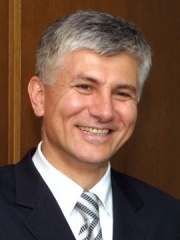
5. Zoran Đinđić (1952 - 2003)
With an HPI of 73.16, Zoran Đinđić is the 5th most famous Bosnian, Herzegovinian Politician. His biography has been translated into 56 different languages.
Zoran Đinđić (Serbian Cyrillic: Зоран Ђинђић, pronounced [zɔ̝̌ran d͡ʑîːnd͡ʑit͡ɕ] ; 1 August 1952 – 12 March 2003) was a Serbian politician and philosopher who served as the prime minister of Serbia from 2001 until his assassination in 2003. He was the mayor of Belgrade in 1997, becoming the first non-communist and first democratically elected official to hold both key positions after World War II. Đinđić was a long-time opposition politician and held a doctorate in philosophy. Đinđić was one of the original thirteen restorers of the modern day Democratic Party, becoming its president in 1994. During the 1990s, he was one of the co-leaders of the opposition to the administration of Slobodan Milošević, and became the Prime Minister of Serbia in 2001 after the overthrow of Milošević. As Prime Minister, he advocated pro-democratic reforms and the integration of Serbia into European structures. His government ratified the European Convention on Human Rights and implemented innovations in line with the Council of Europe recommendations, which led to the introduction of institutions for the protection of human rights and freedoms, as well as for Serbia and Montenegro to become a member state of the Council of Europe in 2003. His government strongly advocated cooperation with the International Criminal Tribunal for the former Yugoslavia (ICTY). Following the arrest of Special Operations Unit (JSO) members and extradition to the ICTY, the JSO organized an armed mutiny in November 2001 in Belgrade. Đinđić was assassinated in 2003 by Zvezdan Jovanović, a former JSO member operative with ties to the Zemun Clan.

6. Tvrtko I of Bosnia (1338 - 1391)
With an HPI of 72.88, Tvrtko I of Bosnia is the 6th most famous Bosnian, Herzegovinian Politician. His biography has been translated into 32 different languages.
Stephen Tvrtko I (Serbo-Croatian: Stjepan/Stefan Tvrtko / Стјепан/Стефан Твртко; c. 1338 – 10 March 1391) was the first king of Bosnia. A member of the House of Kotromanić, he succeeded his uncle Stephen II as the ban of Bosnia in 1353. As he was a minor at the time, Tvrtko's father, Vladislav, briefly ruled as regent, followed by Tvrtko's mother, Jelena. Early in his personal rule, Tvrtko quarrelled with his country's Roman Catholic clergy but later enjoyed cordial relations with all the religious communities in his realm. After initial difficulties—the loss of large parts of Bosnia to his overlord, King Louis I of Hungary, and being briefly deposed by his magnates—Tvrtko's power grew considerably. He conquered some remnants of the neighbouring Serbian Empire in 1373, after the death of its last ruler and his distant relative, Uroš the Weak. In 1377, he had himself crowned king of Bosnia and Serbia, claiming to be the heir of Serbia's extinct Nemanjić dynasty. As the Kingdom of Bosnia continued to expand, Tvrtko's attention shifted to the Adriatic coast. He gained control of the entire Primorje region and the major maritime cities of the area, established new settlements and started building a navy, but never succeeded in subjugating the lords of the independent Serbian territories. The death of King Louis and the accession of Queen Mary in 1382 allowed Tvrtko to take advantage of the ensuing succession crisis in Hungary and Croatia. After bitter fighting, from 1385 to 1390, Tvrtko succeeded in conquering large parts of Dalmatia, and Croatia proper. Following the Battle of Kosovo in 1389, his tenuous claim to Serbia became a mere fiction, as the Serbian rulers he sought to subdue became vassals of the victorious Ottoman Empire. The Ottoman Turks also launched their first attacks on Bosnia during Tvrtko's reign, but his army was able to repel them. Tvrtko's sudden death in 1391 prevented him from solidifying the Kotromanić hold on Croatian lands. Tvrtko is widely considered one of Bosnia's greatest medieval rulers, having enlarged the country's borders to their greatest extent, left a strong economy, and improved the living standards of his subjects. He was survived by at least one son, Tvrtko II, but was succeeded by Dabiša, under whom Tvrtko's burgeoning realm began to decay.

7. Lala Mustafa Pasha (1500 - 1580)
With an HPI of 70.88, Lala Mustafa Pasha is the 7th most famous Bosnian, Herzegovinian Politician. His biography has been translated into 33 different languages.
Lala Mustafa Pasha (c. 1500 – 7 August 1580), also known by the additional epithet Kara, was an Ottoman general and Grand Vizier from the Sanjak of Bosnia.

8. Biljana Plavšić (b. 1930)
With an HPI of 70.67, Biljana Plavšić is the 8th most famous Bosnian, Herzegovinian Politician. Her biography has been translated into 34 different languages.
Biljana Plavšić (Serbian Cyrillic: Биљана Плавшић; born 7 July 1930) is a Bosnian Serb former politician, university professor and scientist who served as President of Republika Srpska and was later convicted of crimes against humanity for her role in the Bosnian War. Plavšić was indicted in 2001 by the International Criminal Tribunal for the former Yugoslavia (ICTY) for war crimes committed during the Bosnian War. She plea-bargained with the ICTY and was sentenced to 11 years in prison in 2003, to be served in a Swedish prison. She was released on 27 October 2009 after serving two-thirds of her sentence. Plavšić is, together with Radovan Karadžić, the highest ranking Bosnian Serb politician to be sentenced. Before entering politics, she taught biology at the University of Sarajevo.

9. Milorad Dodik (b. 1959)
With an HPI of 70.03, Milorad Dodik is the 9th most famous Bosnian, Herzegovinian Politician. His biography has been translated into 43 different languages.
Milorad Dodik (Serbian Cyrillic: Милорад Додик, pronounced [mîloraːd dǒdik]; born 12 March 1959) is a Bosnian Serb politician who served as the 8th President of Republika Srpska from 2022 until his removal from office in 2025. Having previously held the office from 2010 to 2018, he also served as the 7th Serb member of the Presidency of Bosnia and Herzegovina from 2018 to 2022. Dodik has been the president of the Alliance of Independent Social Democrats (SNSD) since its formation in 1996 and has held several political offices within Republika Srpska, the Serb-majority entity of Bosnia and Herzegovina. He served as the prime minister of Republika Srpska from 1998 to 2001 and again from 2006 to 2010. Initially, both Dodik and the SNSD were viewed as moderate and reformist alternatives to the ultranationalist Serb Democratic Party during the 1990s and early 2000s. However, since then, both Dodik and the SNSD have adopted a more Serbian nationalist and separatist stance, advocating for the right of Bosnian Serbs to self-determination. His tenure has been marked by accusations of authoritarianism from his critics, the undermining of federal Bosnian institutions, and closer ties with both Russia and Serbia. In February 2025, the Court of Bosnia and Herzegovina sentenced Dodik to one year's imprisonment and forbade him from political activity for six years due to defying decisions by the High Representative. The verdict was confirmed in August 2025. The one-year prison sentence was subsequently commuted to a fine. On 18 August, Dodik's appeal was rejected and his mandate as Republika Srpska president was officially terminated, with the termination date marked as 12 June 2025. The National Assembly of Republika Srpska initially disputed this decision, but ultimately accepted it in October 2025.
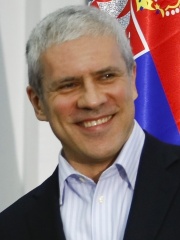
10. Boris Tadić (b. 1958)
With an HPI of 69.36, Boris Tadić is the 10th most famous Bosnian, Herzegovinian Politician. His biography has been translated into 66 different languages.
Boris Tadić (born 15 January 1958) is a Serbian politician who served as the president of Serbia from 2004 to 2012. He led the Democratic Party (DS) from 2004 to 2012 as well, and previously served as minister of defence from 2003 to 2004. Born in Sarajevo, he graduated from the University of Belgrade with a degree in psychology. He later worked as a journalist, military psychologist, and teacher at the First Belgrade Gymnasium. Tadić joined DS in 1990 and was elected to the National Assembly after the 1993 election. After the downfall of Slobodan Milošević in 2000, he was appointed as the minister of telecommunications in the government of the Federal Republic of Yugoslavia, a role which he held until 2003, after which he was appointed minister of defence in the government of Serbia. Tadić was elected president of DS a year after the assassination of Zoran Đinđić after previously serving as a member of its provisional leadership. He stood as a candidate for DS in the 2004 presidential elections, which he won after beating Tomislav Nikolić of the Serbian Radical Party in the second round. During his first mandate, he advocated cooperation and reconciliation of the former Yugoslav countries, became the first Serbian head of state or head of government to visit the Srebrenica Genocide Memorial, and launched an initiative for the Serbian parliament to adopt a resolution condemning the Srebrenica massacre. He successfully ran for re-election in 2008 after again beating Nikolić in the second round. During his second mandate, DS formed a coalition government with the Socialist Party of Serbia, its former opponent, which signed the Stabilisation and Association Agreement (SAA), while the EU abolished visas for Serbian citizens travelling to Schengen Area countries and Serbia received EU candidate status. Additionally, Serbia also completed its obligations to the International Criminal Tribunal for the former Yugoslavia (ICTY). The period during his second mandate was also characterised by the challenges of the 2008 Kosovo declaration of independence and the 2008 financial crisis, leading to low rates of economic growth. After being pressured by protests that were organised by Nikolić's Serbian Progressive Party in 2011, Tadić announced that snap elections will be held in 2012. He lost in the second round to Nikolić, who succeeded him as president of Serbia. Tadić was replaced by Dragan Đilas as the president of DS in November 2012, after which Tadić unsuccessfully sought to become the party's president again in 2014. He then left DS and formed the New Democratic Party, later renamed to Social Democratic Party, which remained a parliamentary party up to the 2020 election, which it boycotted. A self-described liberal, he is an advocate of closer ties with the European Union (EU), supports the accession of Serbia to the European Union, and is widely regarded as pro-Western-orientated, while favouring balanced relations with Russia, China, United States, and the European Union.
People
Pantheon has 68 people classified as Bosnian, Herzegovinian politicians born between 300 and 1987. Of these 68, 34 (50.00%) of them are still alive today. The most famous living Bosnian, Herzegovinian politicians include Biljana Plavšić, Milorad Dodik, and Boris Tadić. The most famous deceased Bosnian, Herzegovinian politicians include Valerius Severus, Sokollu Mehmed Pasha, and Alija Izetbegović. As of April 2024, 1 new Bosnian, Herzegovinian politicians have been added to Pantheon including Zorana Mihajlović.
Living Bosnian, Herzegovinian Politicians
Go to all RankingsBiljana Plavšić
1930 - Present
HPI: 70.67
Milorad Dodik
1959 - Present
HPI: 70.03
Boris Tadić
1958 - Present
HPI: 69.36
Haris Silajdžić
1945 - Present
HPI: 67.96
Vojislav Šešelj
1954 - Present
HPI: 67.82
Fikret Abdić
1939 - Present
HPI: 66.34
Bakir Izetbegović
1956 - Present
HPI: 66.25
Šefik Džaferović
1957 - Present
HPI: 64.28
Željko Komšić
1964 - Present
HPI: 64.26
Nebojša Radmanović
1949 - Present
HPI: 63.24
Borjana Krišto
1961 - Present
HPI: 62.94
Dragan Đokanović
1958 - Present
HPI: 62.89
Deceased Bosnian, Herzegovinian Politicians
Go to all RankingsValerius Severus
300 - 307
HPI: 77.80
Sokollu Mehmed Pasha
1505 - 1579
HPI: 77.24
Alija Izetbegović
1925 - 2003
HPI: 76.98
Ante Pavelić
1889 - 1959
HPI: 76.53
Zoran Đinđić
1952 - 2003
HPI: 73.16
Tvrtko I of Bosnia
1338 - 1391
HPI: 72.88
Lala Mustafa Pasha
1500 - 1580
HPI: 70.88
Vukašin of Serbia
1320 - 1371
HPI: 68.68
Ante Marković
1924 - 2011
HPI: 68.09
Catherine of Bosnia
1425 - 1478
HPI: 67.07
Ban Kulin
1163 - 1204
HPI: 66.49
Stephen II, Ban of Bosnia
1292 - 1353
HPI: 66.41
Newly Added Bosnian, Herzegovinian Politicians (2025)
Go to all RankingsOverlapping Lives
Which Politicians were alive at the same time? This visualization shows the lifespans of the 17 most globally memorable Politicians since 1700.

